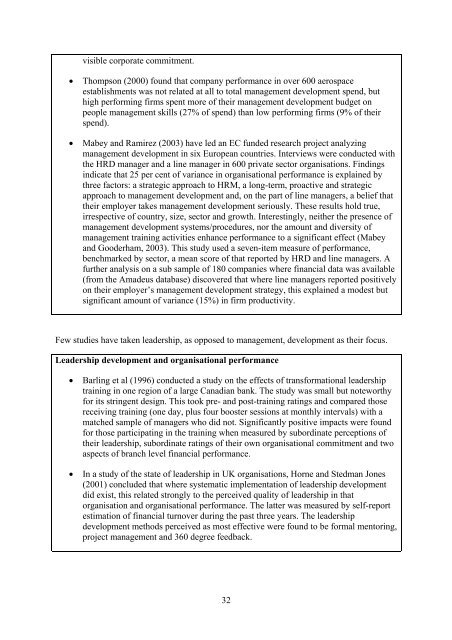The Development of Management and Leadership Capability and its ...
The Development of Management and Leadership Capability and its ...
The Development of Management and Leadership Capability and its ...
Create successful ePaper yourself
Turn your PDF publications into a flip-book with our unique Google optimized e-Paper software.
visible corporate commitment.<br />
• Thompson (2000) found that company performance in over 600 aerospace<br />
establishments was not related at all to total management development spend, but<br />
high performing firms spent more <strong>of</strong> their management development budget on<br />
people management skills (27% <strong>of</strong> spend) than low performing firms (9% <strong>of</strong> their<br />
spend).<br />
• Mabey <strong>and</strong> Ramirez (2003) have led an EC funded research project analyzing<br />
management development in six European countries. Interviews were conducted with<br />
the HRD manager <strong>and</strong> a line manager in 600 private sector organisations. Findings<br />
indicate that 25 per cent <strong>of</strong> variance in organisational performance is explained by<br />
three factors: a strategic approach to HRM, a long-term, proactive <strong>and</strong> strategic<br />
approach to management development <strong>and</strong>, on the part <strong>of</strong> line managers, a belief that<br />
their employer takes management development seriously. <strong>The</strong>se results hold true,<br />
irrespective <strong>of</strong> country, size, sector <strong>and</strong> growth. Interestingly, neither the presence <strong>of</strong><br />
management development systems/procedures, nor the amount <strong>and</strong> diversity <strong>of</strong><br />
management training activities enhance performance to a significant effect (Mabey<br />
<strong>and</strong> Gooderham, 2003). This study used a seven-item measure <strong>of</strong> performance,<br />
benchmarked by sector, a mean score <strong>of</strong> that reported by HRD <strong>and</strong> line managers. A<br />
further analysis on a sub sample <strong>of</strong> 180 companies where financial data was available<br />
(from the Amadeus database) discovered that where line managers reported positively<br />
on their employer’s management development strategy, this explained a modest but<br />
significant amount <strong>of</strong> variance (15%) in firm productivity.<br />
Few studies have taken leadership, as opposed to management, development as their focus.<br />
<strong>Leadership</strong> development <strong>and</strong> organisational performance<br />
• Barling et al (1996) conducted a study on the effects <strong>of</strong> transformational leadership<br />
training in one region <strong>of</strong> a large Canadian bank. <strong>The</strong> study was small but noteworthy<br />
for <strong>its</strong> stringent design. This took pre- <strong>and</strong> post-training ratings <strong>and</strong> compared those<br />
receiving training (one day, plus four booster sessions at monthly intervals) with a<br />
matched sample <strong>of</strong> managers who did not. Significantly positive impacts were found<br />
for those participating in the training when measured by subordinate perceptions <strong>of</strong><br />
their leadership, subordinate ratings <strong>of</strong> their own organisational commitment <strong>and</strong> two<br />
aspects <strong>of</strong> branch level financial performance.<br />
• In a study <strong>of</strong> the state <strong>of</strong> leadership in UK organisations, Horne <strong>and</strong> Stedman Jones<br />
(2001) concluded that where systematic implementation <strong>of</strong> leadership development<br />
did exist, this related strongly to the perceived quality <strong>of</strong> leadership in that<br />
organisation <strong>and</strong> organisational performance. <strong>The</strong> latter was measured by self-report<br />
estimation <strong>of</strong> financial turnover during the past three years. <strong>The</strong> leadership<br />
development methods perceived as most effective were found to be formal mentoring,<br />
project management <strong>and</strong> 360 degree feedback.<br />
32
















